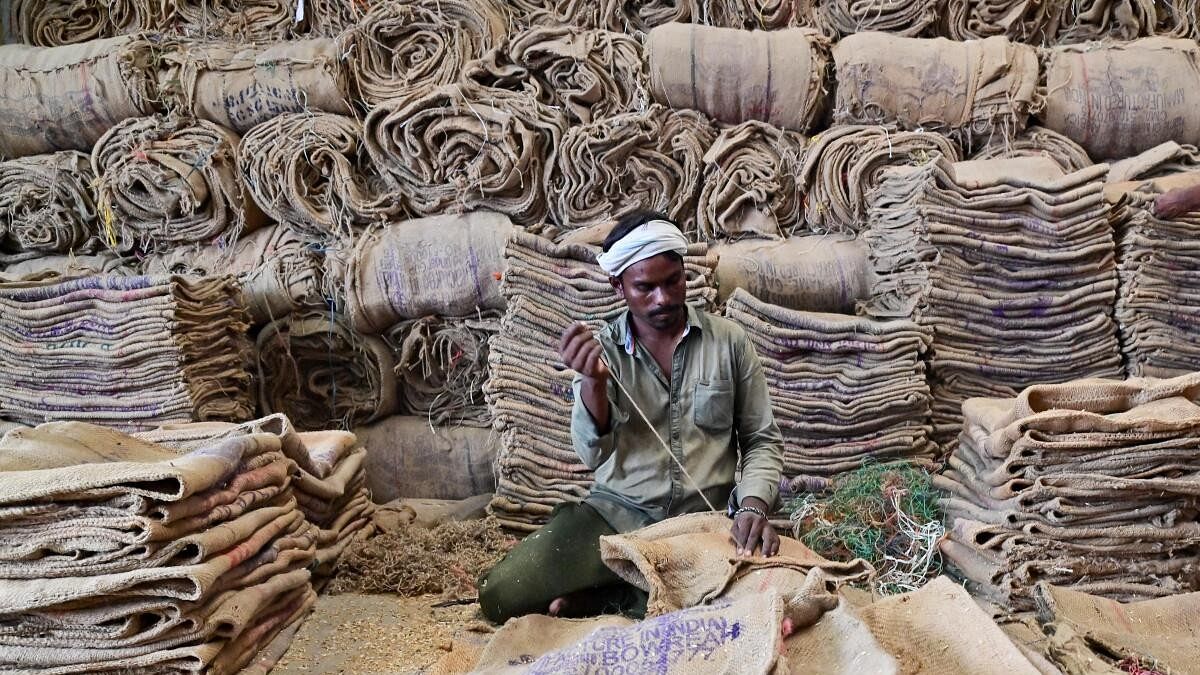
The jute industry is faced with a crisis following reduced orders from customers, as prices of the golden fibre plummeted below Rs 5,000 per quintal, while the Minimum Support Price (MSP) is Rs 5,335 per quintal for the 2024-25 season.
Credit: DH picture
Kolkata: The jute industry is faced with a crisis following reduced orders from customers, as prices of the golden fibre plummeted below Rs 5,000 per quintal, while the Minimum Support Price (MSP) is Rs 5,335 per quintal for the 2024-25 season.
This alarming drop in prices has occurred despite projections of reduced production by the Expert Committee on Jute (ECJ), primarily due to significantly reduced orders for GBT (Gunny Burlap Textile) bags by the Food Corporation of India (FCI) and State Procuring Agencies (SPAs).
"The raw jute price has slumped. The price for the new raw jute season (June-July) ideally should have been Rs 5,800, but it has come down to Rs 5000 per quintal," Om Prakash Soni of the Jute Balers Association told PTI on Tuesday.
He said that the industry is reeling under a situation which it has not seen in decades, with orders halved for mills, leading to operations only for two shifts and just 4-5 days a week.
The MSP for jute in 2023-24 was Rs 5,050 per quintal.
"The carryforward stock will be huge 30 lakh bales in the industry. This season, farmers will have to make distress sales for their new crop, which will hit in a month," Soni added.
Central jute trade unions have also sought an appointment with the West Bengal Labour Minister and the Jute Commissioner to highlight the situation of low orders for mills, which will impact the employment of the 2.5-3 lakh mill workers attached to the sector in the state.
Industry veteran and former Indian Jute Mills Association chairman Sanjay Kajaria said the FCI and SPAs have drastically reduced their orders for GBT bags, resulting in a surplus of finished jute bales in mills’ godowns.
With no new orders in sight, many jute mills have been forced to cut back on production and reduce shifts, leading to severe economic repercussions for the industry, he said.
"Despite the ECJ’s projections of a decline in production, raw jute is being sold at prices below Rs 5,000 per quintal, far below the MSP. This pre-season price slump will compound the difficulties faced by both farmers and mill workers.
"The central government must take immediate steps to ensure that farmers receive at least the MSP for their produce. This includes strict enforcement of MSP and facilitating direct procurement from farmers," Kajaria said.
"To prevent the situation from becoming graver, the FCI and SPAs need to increase their orders for GBT bags to stabilize the market and support the jute industry. Timely and adequate orders can help reduce the surplus in mills and prevent further production cuts," Kajaria added.
The government should also provide financial assistance and support to jute farmers and workers affected by the crisis. This could include subsidies, financial aid packages, and programs to support alternative livelihoods, he suggested.
Meanwhile, sources said Jute Commissioner Moloy Chandan Chakrabortty is in Delhi to meet senior Union textile ministry officials.
Chakrabortty could not be contacted for his reactions.